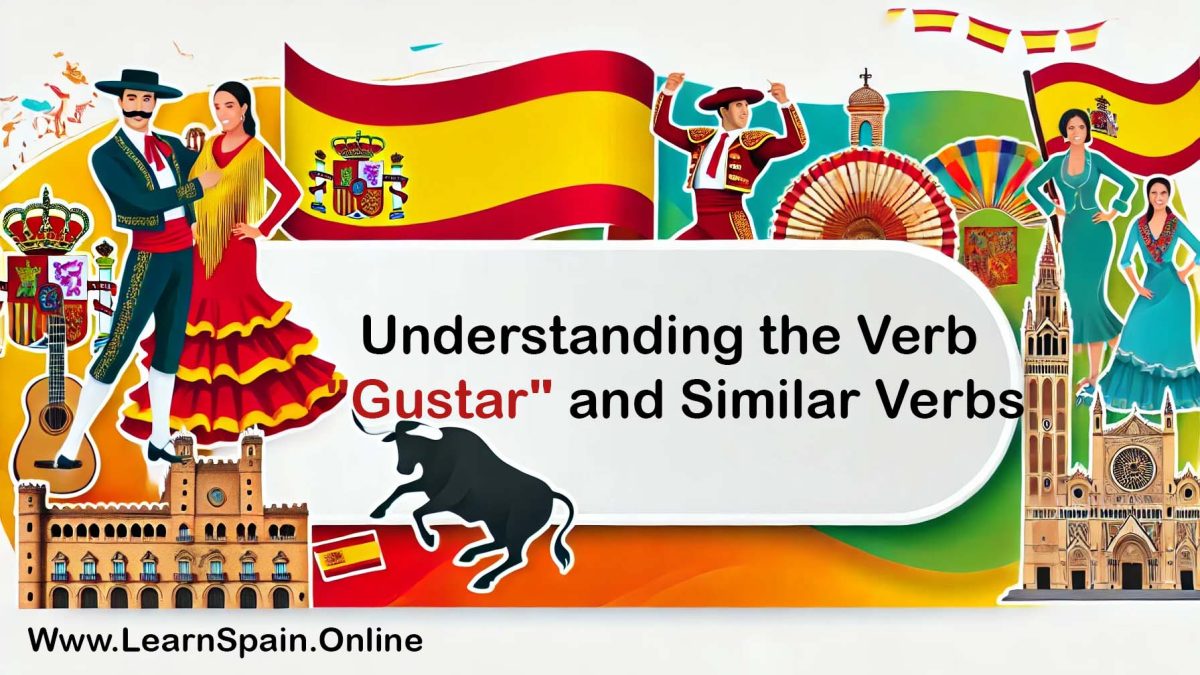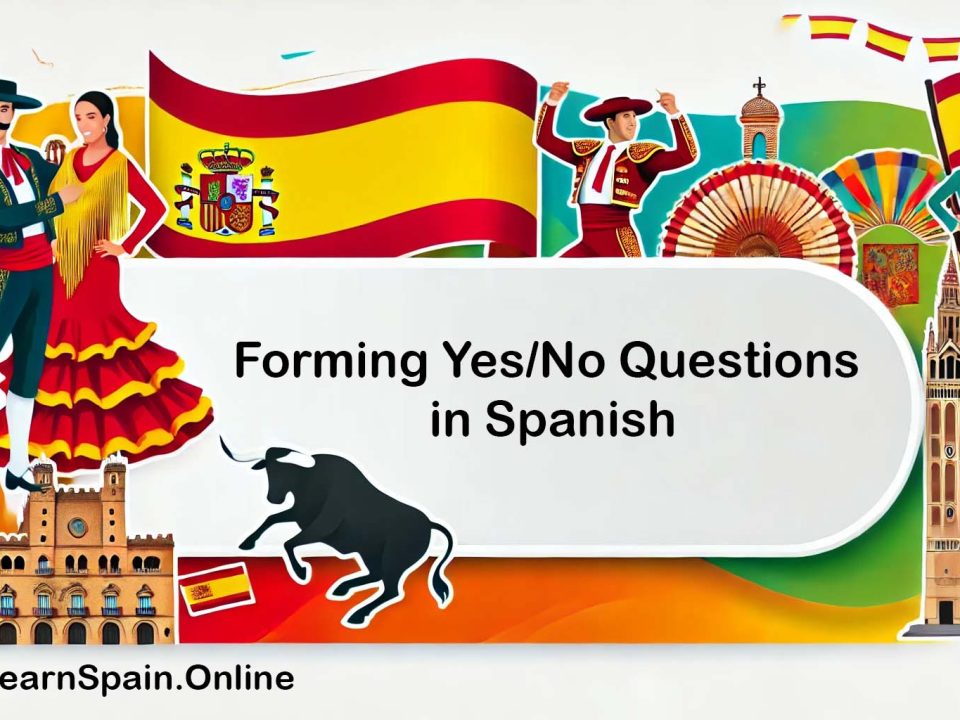
Learning Body Parts Vocabulary in Spanish
August 2, 2024
Simple Negation in Spanish
August 6, 2024Understanding the Verb “Gustar” and Similar Verbs
One of the unique aspects of learning Spanish is mastering the verb “gustar” and similar verbs. Unlike in English, where the subject typically performs an action, “gustar” and similar verbs function differently. This guide will provide a comprehensive overview of how “gustar” and similar verbs work, including their conjugation, usage, and numerous examples to help you understand and apply this aspect of Spanish grammar.
The Basics of “Gustar”
The verb “gustar” translates to “to like” in English, but its structure is different. In Spanish, the thing that is liked is the subject, and the person who likes it is the indirect object. Therefore, instead of saying “I like apples,” you would say “Me gustan las manzanas,” which directly translates to “Apples are pleasing to me.”
Conjugation of “Gustar”
“Gustar” is conjugated based on the thing being liked (the subject) and not the person who likes it. Here are the conjugations for singular and plural subjects:
- Singular subject: gusta
- Plural subject: gustan
Indirect Object Pronouns
The person who likes something is indicated by an indirect object pronoun:
- Me: to me
- Te: to you (informal)
- Le: to him/her/you (formal)
- Nos: to us
- Os: to you all (informal, used in Spain)
- Les: to them/you all (formal)
Examples with “Gustar”
- Me gusta el chocolate. (I like chocolate.)
- Te gusta la música. (You like music.)
- Le gusta el cine. (He/She/You like the cinema.)
- Nos gustan las películas. (We like movies.)
- Os gustan los deportes. (You all like sports.)
- Les gusta la comida italiana. (They/You all like Italian food.)
Constructing Sentences with “Gustar”
To construct sentences with “gustar,” follow this structure:
- Indirect object pronoun + gustar (conjugated) + subject
Similar Verbs to “Gustar”
There are several other verbs that function similarly to “gustar,” where the subject and indirect object pronouns are used in the same way. Some of these verbs include:
- Encantar: to love (something)
- Interesar: to interest
- Importar: to matter
- Fascinar: to fascinate
- Molestar: to bother
- Parecer: to seem
- Quedar: to remain, to fit
- Doler: to hurt
Examples with Similar Verbs
- Encantar (to love)
- Me encanta el café. (I love coffee.)
- Nos encantan los libros. (We love books.)
- Interesar (to interest)
- Te interesa la historia. (History interests you.)
- Les interesan los deportes. (Sports interest them.)
- Importar (to matter)
- Me importa mi familia. (My family matters to me.)
- Nos importan tus opiniones. (Your opinions matter to us.)
- Fascinar (to fascinate)
- Le fascina la ciencia. (Science fascinates her.)
- Os fascinan las estrellas. (The stars fascinate you all.)
- Molestar (to bother)
- Me molesta el ruido. (Noise bothers me.)
- Te molestan las mentiras. (Lies bother you.)
- Parecer (to seem)
- Me parece una buena idea. (It seems like a good idea to me.)
- Les parecen interesantes las clases. (The classes seem interesting to them.)
- Quedar (to remain, to fit)
- Nos quedan diez minutos. (We have ten minutes left.)
- Te queda bien el vestido. (The dress fits you well.)
- Doler (to hurt)
- Me duele la cabeza. (My head hurts.)
- Nos duelen los pies. (Our feet hurt.)
Practice Exercises
To reinforce your understanding of “gustar” and similar verbs, try these exercises:
- Translate the Sentences: Translate the following sentences into Spanish using “gustar” or similar verbs:
- I like reading books.
- They love traveling.
- Music interests us.
- Noise bothers him.
- It seems like a good plan to me.
- My stomach hurts.
- Complete the Sentences: Fill in the blanks with the correct form of the verb and indirect object pronoun:
- __ gusta la película. (We like the movie.)
- __ fascinan los animales. (You all love animals.)
- __ importa el medio ambiente. (The environment matters to them.)
- __ interesa aprender español. (I’m interested in learning Spanish.)
- __ molesta el tráfico. (The traffic bothers you.)
- Match the Verbs with Their Meanings: Match each verb with its correct meaning:
- Encantar
- Interesar
- Importar
- Fascinar
- Molestar
- Parecer
- Quedar
- Doler a. To interest
b. To love
c. To bother
d. To seem
e. To hurt
f. To fascinate
g. To matter
h. To remain, to fit
- Construct Sentences: Create sentences using the following prompts:
- Me / encantar / viajar
- Te / interesar / la ciencia
- Le / molestar / la música alta
- Nos / parecer / buena idea
- Les / doler / las piernas
Additional Tips for Learning “Gustar” and Similar Verbs
- Practice Regularly: Use “gustar” and similar verbs in your daily interactions to become more comfortable with their forms.
- Engage with Media: Watch Spanish movies, TV shows, or listen to songs that use these verbs to hear them in context.
- Create Flashcards: Make flashcards with these verbs and their meanings to reinforce your memory.
- Use Language Apps: Utilize language learning apps that focus on these verbs and practice with interactive exercises.
Conclusion
Understanding and mastering the verb “gustar” and similar verbs is essential for effective communication in Spanish. By familiarizing yourself with their structure and practicing their usage in sentences, you will enhance your ability to express likes, interests, and other emotions accurately. Regular practice and application of these verbs will help solidify your understanding and build your confidence in using “gustar” and similar verbs fluently. ¡Buena suerte! (Good luck!)
Links:
Spanish Grammar
Spanish Vocabulary
Spanish Listening
Spanish Stories



3 Comments
Hi! This is my first visit to your blog! We are a group of volunteers and starting a new project in a community in the
same niche. Your blog provided us valuable information to
work on. You have done a marvellous job!
Howdy! Someone in my Facebook group shared this website with us so I came to give it a look.
I’m definitely loving the information. I’m book-marking and will
be tweeting this to my followers! Great blog and terrific style and design.
Feel free to surf to my page: injury attorney
I leave a response when I especially enjoy a article on a site or if I have something to valuable
to contribute to the conversation. It’s a result of the passion displayed in the article I
looked at. And after this post Understanding the Verb "Gustar" and Similar Verbs – learnspain.online.
I was actually excited enough to drop a thought 😛 I actually do have 2 questions for
you if you don’t mind. Could it be simply me or do some of these remarks come across like they
are left by brain dead visitors? 😛 And, if you are posting at other online sites, I would like to keep up with anything new you have to post.
Would you list all of all your shared pages
like your twitter feed, Facebook page or linkedin profile?
My web-site – Criminal Lawyer